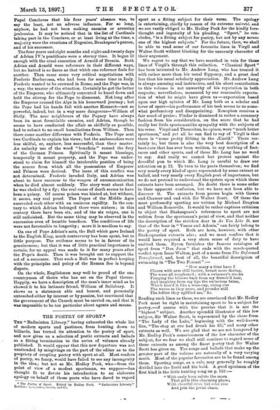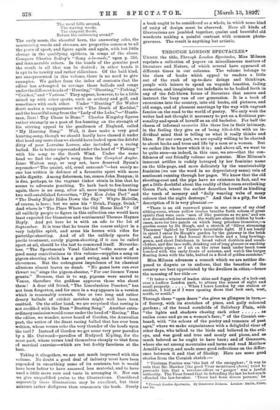THE POETRY OF SPORT.*
THE "Badminton Library," having exhausted the whole list of modern sports and pastimes, from bunting down to billiards, has turned its attention to the poetry of sport, and now gives us a selection of poetic extracts and ballads as a fitting termination to the series of volumes already published. It would appear that this new departure was not unattended by misgivings on the part of the editor as to the propriety of coupling poetry with sport at all. Most readers of poetry, we fancy, would have failed to see any incongruity in the idea ; but not so Mr. Hedley Peek, who—from the point of view of a modest sportsman, we suppose—has thought fit to devote his introduction to an elaborate apology on behalf of those poets who have dared to regard • The Poetry of Sport. Edited by Hedley Peek. Badminton Library." London : Lin.reatr. Green. and Cu.
sport as a fitting subject for their verse. The apology is entertaining, chiefly by reason of its extreme naivete, and we are vastly obliged to Mr. Hedley Peek for the kindly fore- thought and ingenuity of his pleading. "Sport," he con- cludes, "is a fitting subject for poetry, but not by any mean' one of the highest subjects." For the future, then, we shall be able to read some of our favourite lines in Virgil and Walter Scott without blushing for the unseemly character of their argument.
We regret to say that we have searched in vain for those lines of Virgil's through this collection. " Classical Sport " has been intrusted to Mr. Andrew Lang, who has treated it with rather more than his usual flippancy, and a great deal less than his usual scholarly appreciation. Mr. Andrew Lang is always amusing and instructive, and his short contribution to this volume is not unworthy of his reputation in both respects; nevertheless, measured by our reasonable expecta- tion of what be might have given us—expectation based upon our high opinion of Mr. Lang both as a scholar and lover of sport—his performance of his task seems to us some- what perfunctory and disappointing. Xenophon receives a fair meed of praise; Pindar is dismissed in rather a summary fashion from his consideration, on the score that be had really but little sportsmanlike sympathy with the subjects of his verse. Virgil and Theocritus, he opines, were " much better sportsmen," and yet all he can find to say of Virgil is that there is " some pretty fibbing in the 2Eneid." There cer- tainly is ; but there is also the very best description of a boat-race that has ever been written, to say nothing of foot- races and other sports, and of these Mr. Lang has no word to say. And really we cannot but protest against the dreadful pun to which Mr. Lang is careful to draw our attention on p. 12. To turn to the poets themselves; we find very nearly every kind of sport represented by some extract or ballad, and very nearly every English poet of importance, but we do not pretend to understand the system upon which these extracts have been arranged. No doubt there is some order in their apparent confusion, but we have not been able to discover it. The extracts from poems begin with Gower and Chaucer and end with Sir Walter Scott. Of these the most professedly sporting are written by Michael Drayton and William Somervile. It would be rather captious criticism to object that Shakespeare's references to sport are not
written from the sportsman's point of view, and that neither the description of the stricken deer in As You Like It, nor that of the boar in " Venus and Adonis," can fairly belong to
the poetry of sport. Both are here, however, with other Shakespearian extracts also ; and we mast confess that it would have required a very stern sense of duty to have
omitted them. Byron furnishes the famous catalogue of sport from " Dan Juan " that ends with the much-quoted verdict upon Isaac Walton, part of a scene from The Deformed Transformed, and, best of all, the beautiful description of
swimming in "The Two Foscari " :—
" How many a time have I Cloven with arm still lustier, breast more daring, The wave all roughened ; with a swimmer's stroke Flinging the billows back from my drench'd hair, And laughing from my lips the audacious brine, Which kiss'd it like a wine-cup, rising o'er The waves as they arose, and prouder still The loftier they uplifted me," Sc.
Reading such lines as these, we are convinced that Mr. Hedley Peek must be right in maintaining sport to be a subject for poetry,—of course with the proviso that it is not the " highest " subject. Another splendid illustrator of this low subject, Sir Walter Scott, is represented by the chase from "The Lady of the Lake," beginning with the well-known line, "The stag at eve had drunk his fill," and many other extracts as well. We are glad that we are not hampered by Mr. Hedley Peek's consciousness of the low character of the subject, for we fear we shall still continue to regard some of these extracts as among the finest poetry that Sir Walter Scott has given us. The songs and ballads that make up the greater part of the volume are naturally of a very varying merit. Most of the popular favourites are to be found among them. Sporting songs, as a rule, may generally be roughly divided into the florid and the bald. A good specimen of the first kind is the little hunting song on p. 169
With early horn salute the morn That gilds this charming place; With chEerful cries bid echo rise
And join the jovial chase,
The vocal hills around, The waving woods, The chrystal floods, Return the enlivening sound."
The early morn, the cheerful horn, the answering echo, the murmuring woods and streams, are properties common to all the poets of sport, and figure again and again, with but little
change in the qualifying epithets, in songs of the chase. Compare Charles Sedley's " Song a-la-mode," upon p. 316, and innumerable others. In the hands of the genuine poet
the result is all that can be desired ; in other hands it is apt to be tawdry and rather ridiculous. Of the bald kind, not unrepresented in this volume, there is no need to give examples. We gather from the index of contents that the editor has attempted to arrange these ballads and songs under the different heads of "Hunting," "Shooting," "Fishing," "Cricket," and "Various." They appear, however, to be a little mixed up with other sports, such as archery and golf, and sometimes with each other. Under "Hunting" Sir Walter Scott makes a reappearance with " The Death of Keeldar," and the beautiful song from the "Lady of the Lake,"—"Hunts- man, Rest! Thy Chase is Done." Charles Kingsley figures rather strangely as a poet of fox-hunting on the strength of his stirring appeal to the gentlemen of England, called "My Hunting Song." Well, it does make a very good hunting-song, though we should hardly have classed it under that head any more than we should have looked upon the doleful ditty of poor Lorraine Lorree, also included, as a racing
ballad. He is better represented under the head of " Fishing" with his song to the South Wind. Under the same head we find the angler's song from the Compleat Angler.
Izaac Walton may, or may not, have deserved Byron's reproach—" The quaint, old, cruel coxcomb "—but surely no one has written in defence of a favourite sport with more noble dignity. Among fishermen, too, comes John Bunyan; it is due, perhaps, to the vagrant tinker strain in him that he seems to advocate poaching. To hark back to fox-hunting again, there is no song, after all, more inspiring than those two well-established favourites, " D'ye Ken John Peel " and "The Dusky Night Rides Down the Sky." Whyte Melville, of course, is here; but we miss his " Drink, Puppy, Drink." And where is " The Place Where the Old Horse Died " P Of all unlikely people to figure in this collection one would have least expected the blameless and sentimental Thomas Haynes Bayly. And yet here he is with an ode to the 1st of September. It is true that he treats the coarse subject in a very ladylike spirit, and arms his heroes with rifles for partridge-shooting. And of all the unlikely sports for poetic treatment, surely pigeon-shooting, if it can be called sport at all, should be the last to commend itself. Neverthe- less, " The Sportsman's Vocal Cabinet "—the source of a good many contributions to this volume—supplies a song on pigeon-shooting which has a good swing, and is not without cleverness. But the outrageous impudence of its classical allusions almost leaves us dumb. "No game laws can ever thwart us," sings the pigeon-shooter, "For our licence Venus grants." Because, that is to say, pigeons were sacred to Venus, therefore the goddess approves those who shoot them ! A dear old friend, "The Lincolnshire Poacher," has not been forgotten, and for once in a way appears in a version which is reasonably correct. One or two long and rather dreary ballads of cricket matches might well have been omitted. On the other hand, we are surprised that rowing is not credited with the Eton "Boating Song." Another extra- ordinary omission would come under the head of "Racing." Has the editor, we wonder, never heard of Gordon, the Australian poet, the writer of the finest racing ballad that has ever been written, whose verses echo the very thunder of the hoofs upon the turf ? Instead of Gordon we get some very poor parodies
by a Mr. Outwood—parodies of Rndyard Kipling, for the most part, whose verses lend themselves cheaply to that form
of metrical exercise—which are but feebly facetious at the best.
Taking it altogether, we are not much impressed with this volume. No doubt a good deal of industry must have been expended in unearthing some of its contents, but it would have been better to have amassed less material, and to have used a little more care and taste in arranging it. Nor can we give unqualified praise to the illustrations. Considered separately these illustrations may be excellent, but their mixture rather disfigures than ornaments the book. Surely and co. a book ought to be considered as a whole, in which some kind of unity of design must be observed. Here all kinds of illustrations are jumbled together, quaint and beautiful old woodcuts making a painful contrast with common photo- gravures. The result is anything but artistic.



































 Previous page
Previous page